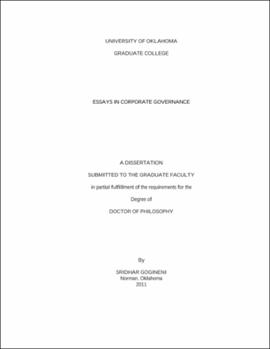| dc.contributor.advisor | Linn, Scott||Yadav, Pradeep | |
| dc.creator | Gogineni, Sridhar | |
| dc.date.accessioned | 2019-05-01T17:22:30Z | |
| dc.date.available | 2019-05-01T17:22:30Z | |
| dc.date.issued | 2011 | |
| dc.identifier | 99107073902042 | |
| dc.identifier.uri | https://hdl.handle.net/11244/319384 | |
| dc.description.abstract | This dissertation is a collection of three essays that investigate the role and importance of corporate governance in public and private firms. Chapter 1, investigates the role of governance characteristics in determining the probability of a firm undergoing a going private transaction. Firms with greater board control are more likely to go private while firms with strong anti-takeover provisions are more likely to be acquired by other public companies. The positive relationship between greater board control and the likelihood of going private is driven by private equity backed deals. Shareholder voting restrictions do not affect firms' survival status while a higher number of state antitakeover laws reduces the likelihood of being acquired. Abnormal returns to shareholders are much lower for going private transactions than for acquisitions by public firms. The results suggest that governance provisions affect shareholder wealth during change of control transactions by playing an important role in determining the type of acquirer. Chapter 2 presents new empirical evidence on the agency costs which emerge from the vertical (ownership versus control) and horizontal (majority versus minority) agency problems. Agency costs increase as firms move from a single owner/single manager ownership structure to more complicated ownership structures. Within each ownership structure, agency costs are significantly higher when firms are not managed by owners. Agency costs are lower in firms with shared control of ownership. Horizontal agency costs are lower in firms where control is contestable. Chapter 3 examines the determinants of cash holdings in private firms. Cash holdings in private firms support both the trade-off theory and the financing hierarchy theory. Cash holdings in private firms decrease significantly with size, firm age, net working capital and leverage. Private firms that pay dividends hold more cash and that cash holdings increase significantly with capital expenditures and cash flow volatility. Better governed private firms hold significantly more cash than private firms associated with weak governance structures. | |
| dc.format.extent | 169 pages | |
| dc.format.medium | application.pdf | |
| dc.language | en_US | |
| dc.relation.requires | Adobe Acrobat Reader | |
| dc.subject | Corporate governance | |
| dc.subject | Going private (Securities) | |
| dc.subject | Agency costs | |
| dc.subject | Corporations--Cash position | |
| dc.title | Essays in Corporate Governance | |
| dc.type | text | |
| dc.type | document | |
| dc.thesis.degree | Ph.D. | |
| ou.group | Michael F. Price College of Business | |
